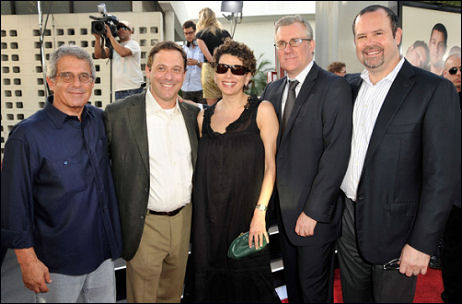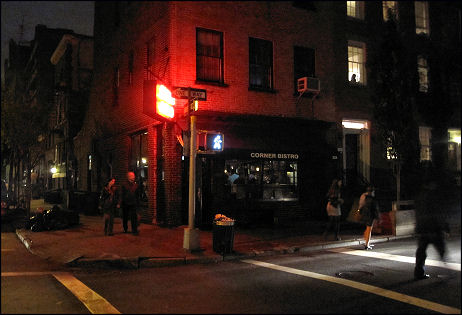Paramount has shifted the opening of Jason Reitman‘s Up In The Air back to December — 12.4, to be exact — to avoid any overlap with Overture’s The Men Who Stare At Goats. Both films star George Clooney. Air is expected to be a bigger commercial hit, but it can’t hurt to get out of the way of Goats just to be safe.
Day: September 30, 2009
Metal Door Clanks
I should have run the news yesterday that screenwriter-director Roger Avary has been sentenced to a year in jail for causing a car crash on 1.13.08 that resulted in the death of a friend, Andreas Zini. Avary, the director of Rules of Attraction and Killing Zoe and co-author of Pulp Fiction and Beowulf, pleaded guilty last August to gross vehicular manslaughter while intoxicated and other charges in the collision. He also got five years’ probation.
Avary’s attorney, Mark Werksman, told the L.A. Times that his client is heartbroken over the Zini family’s loss. “Roger Avary is a decent man and a good man who has always strived to do the right thing in his life,” Werksman said. “He never meant any harm to anyone, and this was just a terrible accident.”
I posted the following about Roger and his situation on 8.22.09, to wit: “My basic feeling is that after a certain interval of mourning and atonement, you have to move on and make the best of your life in the aftermath of such an event. A writer like Avary should use this tragedy as material. Sometime down the road he needs to write or create something from this.
“I only know that no single event defines a life and that the only way to deal with monumental tragedy is to say, ‘Yes, that happened and I’ll deal with it for the rest of my life, but we all need to turn the page and try to strike a match.'”
Then It Hit Me


The taste of frozen popsicle wine after thawing is slightly different than before freezing
Sniper Piece
Former prosecutor David Wells is claiming that he lied to Roman Polanski: Wanted and Desired director Marina Zenovich about having goaded Judge Laurence J. Rittenband into throwing out the 1978 Roman Polanski plea deal.
Why, I’m asking myself, is the 9.30 Daily Beast article in which Wells recants, and which has suspiciously been written by former O.J. Simpson prosecutor Marcia Clark, appearing at this moment? It’s obviously a mortar shell intended to make the pro-Polanski (or forgive-Polanski) side look bad. It looks to me as if somebody friendly with the Los Angeles D.A.’s office wanted to compromise the integrity of Zenovich’s doc (which the D.A.’s team has reportedly been irked by) and made some calls and pulled some strings. Well, doesn’t it?
I wrote Zenovich for a comment and she didn’t reply. She really needs to put her notes and recollections on the line and set things straight.
Burly Man
Mel Gibson is only 53, but with that jowly, weathered face and heavily-graying hair and that thinning forward thatch and that burly, beer-gutty, don’t-work-out-much physique, he looks like a guy pushing 60 if not a bit older. I know guys who work in hardware stores or auto-parts stores who look like this. Nice dependable guys and all, but movie stars are supposed to look…I don’t know, a little trimmer and tonier. More of a Pierce Brosnan thing going on…right?

Mel Gibson in Jodie Foster’s currently-shooting The Beaver
There’s no contract that says a guy who nine years ago was regarded as moderately hunky or at least in very presentable shape for someone in his mid 40s (in films like What Women Want and Signs) has to remain that way as he gets older. But there is this admittedly old-fashioned idea that movie actors are supposed to look a little spiffier and more 24 Hour Fitnessy than Average Joes of a similar age. Gibson seems to have said to himself a while ago, “The hell with that…my hunk days are over…time for my Jack Nicholson phase, only grayer.”
Voice-Print Identification
This recording of a 1966 Stanley Kubrick interview by Jeremy Bernstein has been around for several years. (It’s on a disc inside Taschen’s Stanley Kubrick Archives book.) But listen to Kubrick’s voice — it could belong to a bright Bronx cab driver or a Bronx-born English teacher in a local high school — and compare it to the voice that Peter Sellers uses in Lolita (’62).
Bad Moon
Boiled down, The Wrap‘s Sharon Waxman is reporting that Universal Studios President Ron Meyer intends to whack the studio’s two co-chairmen Marc Shmuger and David Linde and most likely replace them with marketing chief Adam Fogelson and head of production Donna Langley.

(l. to r.) Ron Meyer, Adam Fogelson, Donna Langley, David Linde, Marc Schmuger
It’s a tough game, running a big-studio film division. Hard to survive, much less “win.” I feel sorry for Schmuger-Linde if this is about to happen. And if it’s not, I still feel sorry for them.
Apart from weak or underwhelming performances of such Universal pics as Bruno, Funny People, Public Enemies, Duplicity, Land of the Lost and State of Play, the beef against Schmuger-Linde, Waxman reports, is that certain producers working with the studio — Brian Grazer, Sean Daniel, Working Title’s Tim Bevan and Eric Fellner — have complained about “being unable to get a consistent answer from a single executive to passive-aggressive eye-rolling from Universal colleagues.
“Producers and talent say they are unable to get clarity on their projects in the current climate ,” she writes. “‘If you’re a producer, you’re feeling chaos in ways that you’ve never felt before,” a prominent anonymous exec tells Waxman. ‘It’s completely taken the fun out of the process.'” Fun?
Mechanic Knows
Last night Nikki Finke posted Bill Mechanic’s keynote speech about the future of indies from yesterday’s Independent Film & Television Production Conference. Mechanic ran Fox from ’94 to ’00, is now an indie producer (Coraline) and owner of Pandemonium LLC. Here’s my favorite portion of the speech:
“It’s disrespectful if not downright dumb to think audiences can’t tell the difference between the original, which occasionally might even have some fresh faces, and the copy, which almost always is populated with retreads. It’s like thinking you can sell yesterday’s news under a different banner.
“The exception to the rule is District 9, which didn’t try to compete with the majors with special effects or stars or plot. Instead of feeling recycled, it was fresh and is now one of the year’s best and most successful pictures. But lot of credit has to go to Peter Jackson since it was undoubtedly his clout that got the film made.
“[Indies] following the lead of the majors presumes that the majors know what they want. It presumes they have a fix on their audiences. I would say that’s anything but true.
“Admissions are down over the past few years and, perhaps most troubling, the audience that Hollywood spends the majority of time focusing on, the under 25’s, are the ones finding other things to do.
“Take a look at this shift over the past decade. While use of the internet and video games have dominated leisure time activities, movie consumption is down or flat over the same period. And, more to the point, you can see that there is a 21% drop in film-going amongst the core target audience and a 24% drop in the next key category, 25-39 year olds.
“And yes, these charts beg another question: if the audiences are shifting, why isn’t the product shifting as well? Name five mainstream films this year that successfully targeted an over-30 year audience.
“In that way, Hollywood in the broadest sense of the word is much like Detroit. It’s a manufacturer’s mentality that reigns, seemingly indifferent to the consumers it serves. Ignore whether the consumer likes our product as long as they buy it. Market it and they will come.
“And don’t worry if they don’t come back. Accept 60% drop-off rates as the norm, saying it’s all about wide openings.
“When was the last time you heard anyone either from a studio or an independent talking about improving their product, of creating positive buzz and expanding the audience?
“Here’s one basic question to ask yourself: If the most popular film in history was Titanic and it did so by weaving together interest in all demographic pockets as well as pulling in non-filmgoers, why in the last 12 years has no one attempted to do the same?
An independent couldn’t and shouldn’t make movies of Titanic’s scale but it should make movies as individualistic and compelling. Certainly there are good examples among some of the smaller independent films — Slumdog Millionaire being an easy choice — that actually do stand out and succeed because of their quality and their uniqueness.
But the independent world [has been] no more concerned with the consumer than the studios. With the influx of hedge fund money, the past decade saw a glutting of product, again most of it with no idea of who it was for or how it could be sold. Whether some of these movies had artistic integrity or not, there is no question there was no audience appeal.
“From the low-water mark of 1990, there has been a 50% increase in the number of pictures and even since 2000, nearly a 25% increase. And most of the influx came from non-majors, rising from 150 in 1990 to 450 in 2008. That, my friends, is insanity.
“Remember that through this entire period, the only growth at the box office has been inflationary, which means more films were fighting for a share of a flat box office. Over approximately this same period, the biggest hits took even a greater share of the box office pie” — i.e., because of an increase in Eloi movie-watching patterns — “meaning the independents, even with a vastly greater number of releases, are taking a dramatically smaller percentage of the available money.”
Another One
Clearly the earthquake-tsunami tragedy that recently happened in Samoa (and American Samoa) has been devastating. Numerical perspective matters not to people who’ve lost homes or loved ones or both, but so far I’m hearing that about 100 have been reported dead so far vs. nearly 230,000 killed in the 2004 Indian ocean tsunami. I know this will make me sound uncaring but my first thought, to be 100% honest, was whether we’re going to see any Roland Emmerich video footage of the waves. I’m just thinking of the footage that got around in ’04. Sorry.
Obiter Dicta
The best quote in Doreen Carvajal and Michael Cieply‘s 9.30 N.Y. Times story about the Roman Polanski furor is one from Marie-Louise Fort, a French lawmaker in the Assembly who has sponsored anti-incest legislation. Fort told Carvajal that she doesn’t believe that public opinion “is spontaneously supporting Mr. Polanski at all…I believe that there is a distinction between the mediagenic class of artists and ordinary citizens that have a vision that is more simple.”
Exactly — “simple” as in bad or good, black or white, torches and pitchforks. Don’t muck things up with amoral qualifications or compassionate perspective or legalistic what-have-you’s. And let’s really keep the feelings and wishes of the now-45-year-old victim out of this. Because this is our deal! This man is a demonic, drug-dispensing, due-process-defying dwarf who must suffer for his sins, and preferably in a medieval cell with straw on the floor and a ball and chain around his ankle.
Demo Habits
A just-released report on 2010 moviegoing habits by Gordon Paddison‘s Stradella Road, a new entertainment marketing firm, said that if movie marketers want to reach younger moviegers in hawking their films, they need to advertise big-time in daily newspapers because print is where it’s at for the under-30 generation.

No, seriously, the report actually said the wisest strategy is to advertise on sites like Hollywood Elsewhere — i.e., smart, provocative, no-holds-barred news-and-discussion sites that deliver cutting-edge commentary, conversation-starters and back-and-forth rancor between the editor/webmaster and readers. Okay, it didn’t actually say that either.
Triple serious and no more put-ons: If movie marketing aces want to sell younger moviegoers on their films, the report urged them “to embrace social networks or risk being ignored,” a story posted last night by Variety‘s Marc Graser summarized.
“The study found that teens and twentysomethings are especially focused on being able to customize entertainment and are quick to share their opinions with others digitally — especially as usage of the Internet, mobile devices and DVRs has become more widespread. An estimated 94% of all moviegoers are now online.
“The younger demo is especially key in spreading word of mouth, with 73% of moviegoers surveyed having profiles on social networking sites.
“It’s a point that’s been made a number of times as sites like MySpace, Facebook and Twitter have grown in popularity. But the study is one of the few to break down specific age groups and how they consume movies and the marketing messages leading up to their releases.
* Eloi (age 13-17) are “all about sharing information and mostly instinctual, proudly anti-literate, lemming-over-the-cliff group thinking,” the report didn’t say, although it might as well have. With social networking a critical communication tool, easily-led Eloi go to movies in large groups and are heavily influenced by their friends’ impulsive, trailer-prompted, defiantly ignorant opinions. This is due to the demo’s staunch refusal (except in the case of X-factor non-Eloi types, who comprise maybe 10% of this group) to read and consider information on movie sites. “They also prefer texting over having phone conversations. More than 70% also surf the web and text while watching TV, and 67% of them socialize with friends online,” the report said.
* Twentysomething Eloi (age 18-29) “are digital natives who have grown up with technology” and are more likely to go online for movie info and to share what they think about movies via social networks (58% socialize with friends online). They use the Internet to find any kind of information and place a high value on online consumer reviews and sites that aggregate reviews.”
* Auds in their 30s (i.e., those starting to use their brains and show actual aesthetic judgment regarding films they’ll pay to see) are “time-constrained, with parenthood dominating their decisions. They split their moviegoing trips between their children and their spouses.” They “spend the highest number of hours online and rep the highest use of technology (Internet, broadband access, DVR ownership and cell phone).” They also view the most recorded TV and skip the most ads via their DVRs.”
* Those in their 40s, the report says, “embrace traditional media like magazines and newspapers, with moviegoing dominated by special family occasions and influenced by teens.” (Really? The internet has been going great guns for at least 15 years and people in their 40s — i.e., those who were in their late 20s and early 30s in the mid ’90s — are basically into dead-tree media? What kind of lazy, grass-munching wildebeests are they?)
* And fiftysomethings “avoid crowds, prefer matinees and ‘skip ads because they think there are too many commercials on TV.'” Fifty-somethings prefer matinees? What else do they prefer? Browsing through funeral home brochures in their spare time? These are 50-somethings trying to live like 80-somethings. People looking to withdraw from life as much as possible. People who watch a lot of TV and like to huddle down with warm blankets and play with their grandchildren twice a year. Paddison needs to find some new 50-somethings for his survey — i.e., people with an actual pulse.

